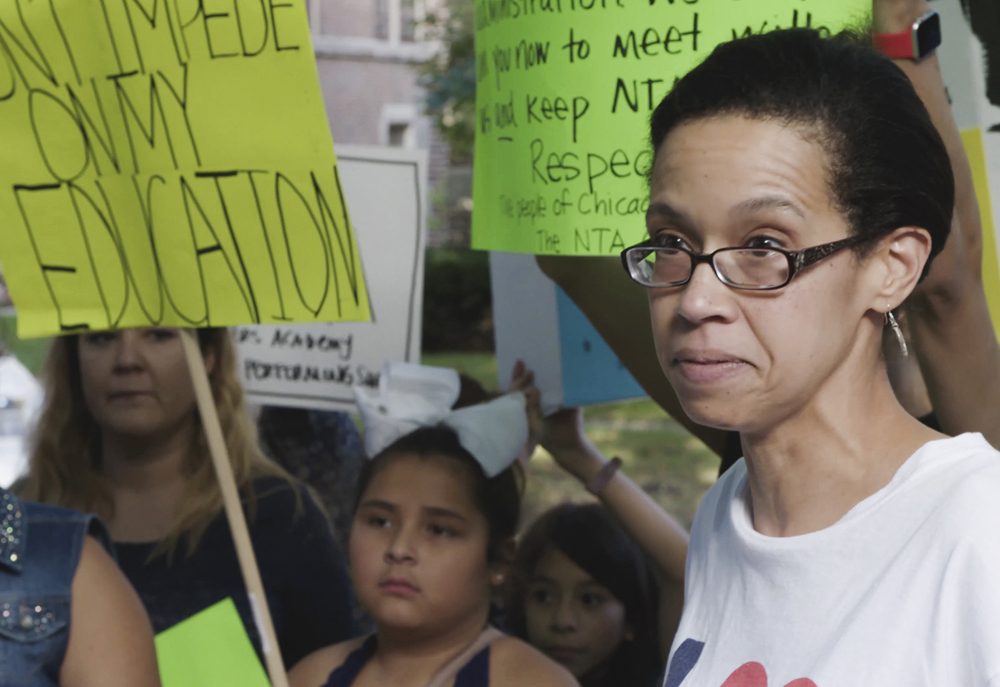“If you don’t advocate for yourself, no one else will,” Isaac Castelaz, the principal at National Teacher’s Academy tells Yaa, one of the more timid students at the elementary school in Chicago despite her impressive GPA in “Let the Little Light Shine.” The one-on-one attention and sensitivity isn’t an uncommon scene at the school, which was initially looked upon with skepticism by the community that lived in the nearby Harold Ickes public housing until Audrey Johnson, an enterprising parent urged the school’s first principal Amy Rome to knock on doors to establish a trust. The gambit worked and the school flourished, the kind of success story that any city would want to tout except apparently Chicago where recent development in the South Loop that brought upper middle class white families and urban professionals to the area en masse and while content to send their kids to another elementary school in the area, those parents saw National Teacher’s Academy as nothing more than a good building for a new high school.
In Kevin Shaw’s meticulously observed and rousing doc, the end of a five-year moratorium on school closures marks the start of a heated battle to keep the doors at NTA open when lobbying by a few mostly white parents who form a coalition called the Prairie District Neighborhood Alliance is enough to potentially push the hundreds of the predominantly Black students of NTA out, undoing all the careful community building that is bound to unravel should the school close. However, neither the students nor their parents or faculty at NTA are willing to go without a fight, inadvertently providing an education for all in activism and the levers of power in local government. Feeling as if it’s a spiritual addendum to the Steve James’ masterful “America To Me” about Chicago’s Oak Park and River Forest High School that’s every bit its equal, it’s no surprise to learn Shaw was a segment director and cinematographer on that series and tailored his approach to his feature directorial debut accordingly, conscientiously assigning separate filmmaking teams based on race to interview parents in different areas of the South Loop, yielding remarkable candor.
Beyond the revealing interviews Shaw and crew get, the film is arranged in such a way that it really feels as if everyone gets their say, which is more than can be said for the Chicago Public School board, whose meetings NTA students have to force their way into. It is telling of the many systemic failures in the city that an official attempts to silence a protest at City Hall by asking NTA protestors to be respectful of the parents whose child was killed by a drunken officer on the upper floor of the building, but the passion behind the demonstrations and even the arguments of the Neighborhood Alliance show the desire to do right by the next generation and the film finds hope in how it’s a fight no one is willing to give up. It is also impossible not to be inspired by any number of the film’s subjects, from the outspoken eighth grader Taylor Wallace, who knows she’ll be graduating soon enough at NTA but refuses to let the door close behind her, to Elisabeth Greer, who leads the charge on the parents’ side to keep NTA open and grows comfortable with raising her voice after not wanting to be seen as a loud black woman. In fact, “Let the Little Light Shine” shows there’s far more power than anyone imagines inside themselves and it’s simply glorious to see it all let out.
“Let the Little Light Shine” will screen at True/False on March 6th at 3:15 pm at the Picturehouse and next at SXSW Edu on March 8th at 1:30 pm at the Austin Convention Center.




